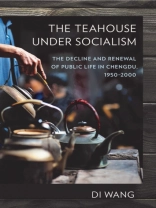To understand a city fully, writes Di Wang, we must observe its most basic units of social life. In The Teahouse under Socialism, Wang does just that, arguing that the teahouses of Chengdu, the capital of Sichuan Province, are some of the most important public spaces-perfect sites for examining the social and economic activities of everyday Chinese.Wang looks at the transformation of these teahouses from private businesses to collective ownership and how state policy and the proprietors’ response to it changed the overall economic and social structure of the city. He uses this transformation to illuminate broader trends in China’s urban public life from 1950 through the end of the Cultural Revolution and into the post-Mao reform era. In doing so, The Teahouse under Socialism charts the fluctuations in fortune of this ancient cultural institution and analyzes how it survived, and even thrived, under bleak conditions.Throughout, Wang asks such questions as: Why and how did state power intervene in the operation of small businesses? How was "socialist entertainment" established in a local society? How did the well-known waves of political contestation and struggle in China change Chengdu’s teahouses and public life? In the end, Wang argues, the answers to such questions enhance our understanding of public life and political culture in the Communist state.
Di Wang
Teahouse under Socialism [PDF ebook]
The Decline and Renewal of Public Life in Chengdu, 1950-2000
Teahouse under Socialism [PDF ebook]
The Decline and Renewal of Public Life in Chengdu, 1950-2000
Купите эту электронную книгу и получите еще одну БЕСПЛАТНО!
язык английский ● Формат PDF ● страницы 330 ● ISBN 9781501715556 ● издатель Cornell University Press ● опубликованный 2018 ● Загружаемые 3 раз ● валюта EUR ● Код товара 6397288 ● Защита от копирования Adobe DRM
Требуется устройство для чтения электронных книг с поддержкой DRM












